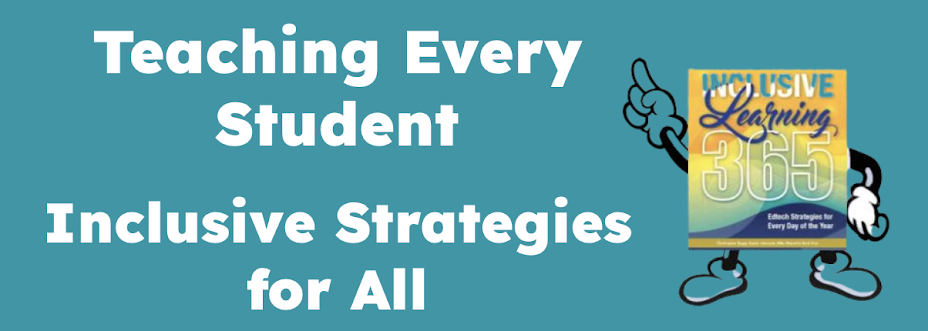I've heard that refrain numerous times.
"But... he doesn't want to be seen as different."
It's usually uttered in response to specific technology recommendations offered during the IEP team process. The team typically nods their head in agreement; after all, it is a priority that the student completes school tasks in the same manner as their peers, or uses the same school tools as their friends.(Or is it?)
Unfortunately, I realize another team is unaware of Universal Design for Learning principles. If they understood UDL, they would appreciate the importance of offering MULTIPLE methods of engagement, presentation and expression. Instead, they are sticking to the "one size fits all" approach, an approach which fails to meet the needs of all learners. It's an approach that allows teams to agree, "He doesn't want to be seen as different."
My challenge to the team is to change the culture, don't let the student be seen as different. Offer multiple methods of expression. Give choices. Offer alternatives to the traditional methods which fail many kids.
Sometimes students need a different method.
A classic example is the Poster Board.
Think of all the poster boards that have been assigned over the years. For some students, the fine motor or visual processing skills required to complete that task are nearly impossible without significant help from home. Paper can be the disability. Two alternatives are Glogster or VoiceThread, free online multimedia tools which minimize the potential output challenges. In addition, these tools can be more engaging.
But don't just change the expectation to ALL students will now create a Glog. Introduce them to the tools. Then let students choose the tool which will help them accomplish the task in the way that works best for them. Promote an environment where they are not seen as different. Every one chooses the method which promotes success. Some students will opt for the paper poster board, others will choose another option.
The essential point is the availability of choice. When there is choice, no one is seen as different. Every student gets what they need.
Easily accomplished in an age of numerous tool choices. Need a starting place? Refer to the UDL Tech Toolkit wiki to get you going.
Showing posts with label UDL Tech Toolkit. Show all posts
Showing posts with label UDL Tech Toolkit. Show all posts
Friday, May 13, 2011
Wednesday, December 15, 2010
Day 4 - Remediation AND Compensation: A Necessary Balancing Act
Anyone who works with struggling learners must grasp the importance of balancing remediation with compensation. Remediation allows the student to gain the foundational skills necessary for academic success.Compensation allows the student to bypass the academic challenges which result from their learning disability, while they are receiving remediation. With compensatory techniques, students have access to the general education curriculum despite their learning challenges. Accommodations remove the obstacles which frequently hinder student success.
Special educators and other specialists, often overemphasize remediation at the expense of accommodation and compensation. What are the unintended consequences of this imbalance?
- Gaps in acquired skills. When remediation alone is emphasized, students are taught at their developmental level. This may be two or more grade levels below their current grade. Their peers continue to have exposure to grade level text and vocabulary while they fall further behind IF accommodations are overlooked.
- Remedial instruction often includes "kill and drill" components making learning less than joyful. How much learning actually occurs in the absence of engagement and joy? (See Judy Willis' work on The Neuroscience of Joyful Learning.)
- Instruction focuses on students' deficits areas, continually pointing out that they are behind their peers and therefore, must not be as smart. Remediation often emphasizes deficits at the expense of strengths.
So, tomorrow, add accommodations which work to your lesson plans. If you need ideas, a good starting place is the UDL Tech Toolkit wiki. Peruse the numerous free tools and strategies.And think how they can bridge the gap and make learning fun again.
Subscribe to:
Posts (Atom)
